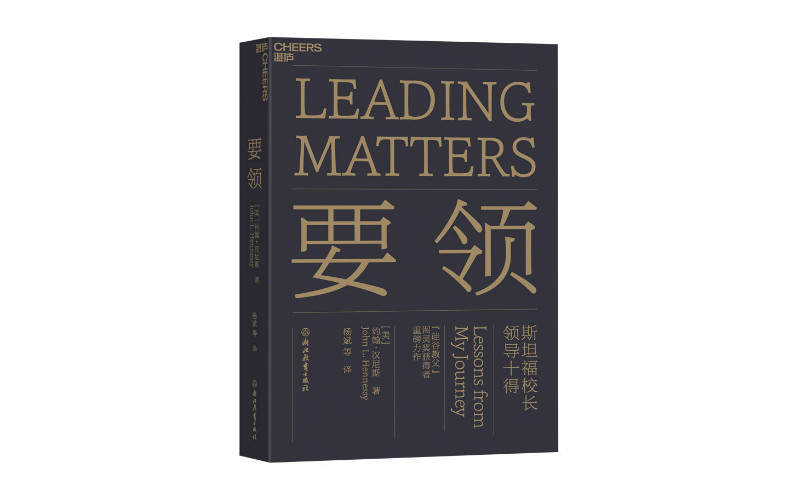Their books provide many perspectives, especially on the way we choose to live.
“Books are the quietest and longest-lasting friends, and they often accompany us; he is the most accessible, the most intelligent consultant, and the most patient teacher.”
Shared today is a personal book list of the former president of Stanford University John Henneth. John Henneth is also Mother Google Chairman of the company’s Alphabet board of directors, Turing Award winner, known as the “Godfather of Silicon Valley.” In his new book “The Essentials”, he summarized the “ten key points” for leaders from the aspects of scientific research, university management, and company management in People with a career opened a book list.
Book title: “The Essentials”
Author: [US] John Hannis (John L. Hennessy)
For John Hannes, this list is some books that he read and learned a lot from. He classified these non-fiction books by subject. Under each topic, I chose a book as an example to share some of his thoughts after reading this book.
In general, he prefers personal biography and history books to books that discuss leadership directly. At the end of the book list, he also provided a list of novelists. Their books provide many perspectives, especially about the way we choose to live.
Ron Chernobyl Alexander Hamilton (New York: Penguin Press, 2004)
David Hackett Fisher Champlain’s Dream (New York: Simon & Schuster, 2008)
David Hackett Fisher Paul Revere’s Ride (New York: Oxford University Press, 1994)
Walter Isaacson Benjamin Franklin: An American Life(New York: Simon & Schuster, 2003)
Jack Lviv Original Meanings: Politics and Ideas in the Making of the Constitution(New York: Alfred A. Knopf, 1996)
Coki Roberts Ladies of Liberty: The Women Who Shaped Our Nation (New York: HarperCollins, 2016)
Other U.S. leaders
David Gallo Bearing the Cross: Martin Luther King Jr. and the Southern Christian Leadership Conference (New York: HarperCollins, 1986) This is a difficult choice because there are many books worth reading on this topic. If you have to choose one, this biography of Martin Luther King is highly recommended. Because it shows Martin Luther King’s leadership journey in a comprehensive wayranscontinental Railroad, 1863–1869 (New York: Simon & Schuster, 2000)
Tocqueville Democracy in America, Volume I and II (various editions; originally published 1835 and 1840)
James M. McPherson Battle Cry of Freedom: The Civil War Era (Oxford, UK; New York: Oxford University Press, 1988)
Louis Menan The Metaphysical Club: A Story of Ideas in America(New York: Farrar, Straus and Giroux, 2001)
Mark Twain Life on the Mississippi(various editions; first published 1883)
Richard White Railroaded: The Transcontinentals and the Making of Modern America (New York: W.W. Norton, 2011)
Gordon S. Wood Empire of Liberty: A History of the Early Republic, 1789-1815 (New York: W.W. Norton, 2011)
Richard Zacks The Pirate Coast: Thomas Jefferson, The First Marines, and the Secret Mission of 1805 (New York: Hyperion, 2005)
American History: The Twentieth Century
David Harperstam The Coldest Winter: America and the Korean War (New York: Hyperion, 2007). Harperstam is based on the story of The Best and the Brightestul Lessons in Personal Change(New York: Simon & Schuster, 1989, 2004)
Robert M. Gates A Passion for Leadership: Lessons on Change and Reform from Fifty Years of Public Service (New York: Vintage, 2016)
Bill George, Pete Sims True North: Discover Your Authentic Leadership (2nd ed., San Francisco: Jossey-Bass, 2015)
Robert K. Greenleaf Servant Leadership: A Journey into the Nature of Legitimate Power and Greatness (New York: Paulist Press, 2002)
Watan Gregory, The Road to Home: My Life and Times (New York: Simon & Schuster, 2003)
The novelists who have a profound influence on me
Dante Alighieri: “Divine Comedy”, especially “Hell”.
Isaac Asimov: His “Base Series” and “Robot Series” are very interesting. These novels all tell what these things mean to humans in the distant future.
Jane Austin: Through her novels, we can appreciate the author’s beautiful words and can appreciate the author’s own personality. In addition, we can see her subtle description of human emotions, especially how emotions affect individual decisions.
Sister Bronte: “Jane Love”, “Whistling Mountain Villa” and “The Tenant in Wildfield”.
Willa Caser: Some novels about the American West
Charles Dickens: In his book we can see exquisite language, realize his own character, and read his story describing the dark side of British society. “Two Cities” is still one of my favorite novels. Dickens’ discussion of justice, love, tenacity, and sacrificial spirit has been passed down. The first sentence at the beginning of the novel is very subtle.
Theodore Dreiser: His novel shows many personal choices that ultimately lead to tragedy.
